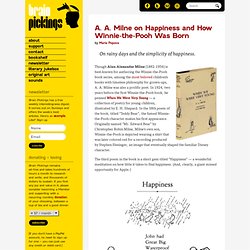

Shawn Achor: The happy secret to better work. Happy 130th Birthday, A. A. Milne: "Happiness" and the Origin of Winnie-the-Pooh. By Maria Popova On rainy days and the simplicity of happiness.

Though Alan Alexander Milne (1882-1956) is best-known for authoring the Winnie-the-Pooh book series, among the most beloved children’s books with timeless philosophy for grown-ups, A. A. Milne was also a prolific poet. In 1924, two years before the first Winnie-the-Pooh book, he penned When We Were Very Young — a collection of poetry for young children, illustrated by E. The third poem in the book is a short gem titled “Happiness” — a wonderful meditation on how little it takes to find happiness. John had Great Big Waterproof Boots on; John had a Great Big Waterproof Hat; John had a Great Big Waterproof Mackintosh– And that (Said John) Is That. Donating = Loving Bringing you (ad-free) Brain Pickings takes hundreds of hours each month. You can also become a one-time patron with a single donation in any amount: Brain Pickings has a free weekly newsletter. Share on Tumblr. Christoph Niemann on Happiness, Work and Creativity.
By Maria Popova How yoga is killing kerning, or what chasing butterflies has to do with divine inspiration. I’m a really big Christoph Niemann fan, so I was thrilled to see him speak last month at Creative Mornings, the fantastic breakfast lecture series by my lovely studiomate Tina (a.k.a. Swiss Miss), dubbed “TED for the rest of us.” Charming, irreverent and self-deprecating as ever, Christoph dances across everything from finding happiness at work to what it takes to have a good idea to the myth of “talent” to how to overcome writer’s block.
Creativity is like chasing chickens.” ~ Christoph Niemann I found this visual breakdown of Christoph’s daily routine, tongue-in-cheek as it may be, quite interesting: Here’s an unwitting wink at RSA’s animated version of Steven Johnson’s insights on where good ideas come from, also echoing my favorite TED talk, Elizabeth Gilbert’s. And something reminiscent of Scott Belsky philosophy on making ideas happen: Donating = Loving Share on Tumblr. Philosophy: Guide to Happiness. We tend to accept that people in authority must be right.

It's this assumption that Socrates wanted us to challenge by urging us to think logically about the nonsense they often come out with, rather than being struck dumb by their aura of importance and air of suave certainty. This six part series on philosophy is presented by popular British philosopher Alain de Botton, featuring six thinkers who have influenced history, and their ideas about the pursuit of the happy life. Socrates on Self-Confidence (Part 1) - Why do so many people go along with the crowd and fail to stand up for what they truly believe? Partly because they are too easily swayed by other people's opinions and partly because they don't know when to have confidence in their own. Seneca on Anger (Part 3) - Roman philosopher Lucious Annaeus Seneca (4BCE-65CE), the most famous and popular philosopher of his day, took the subject of anger seriously enough to dedicate a whole book to the subject. Positive psychology.